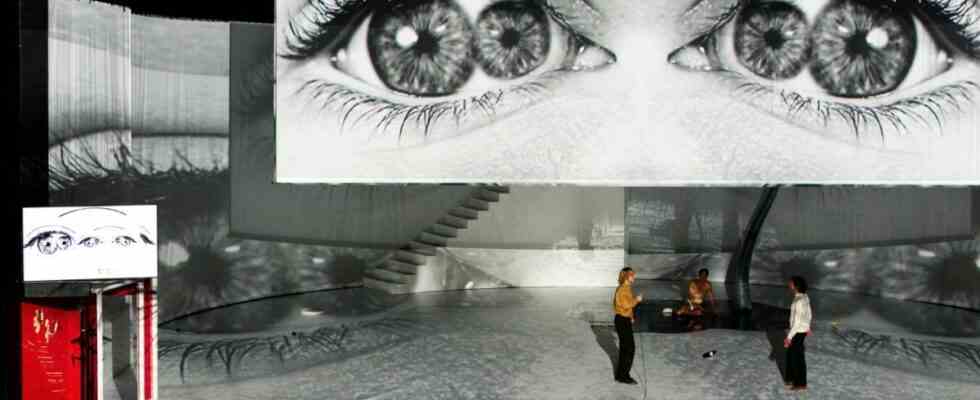Then it happened: On September 13, 2022, Goethe’s “Faust” dropped from the local canon of required reading for upper secondary school. Now you can do your Abitur in Bavaria without ever having read the drama, other federal states have already done this without suffering any major damage. And probably soon you won’t have to come up with “Faust” quotes anymore, unless you want to give the impression of being completely out of date. The German Theater Association reports that in the 2020/21 season “Faust” is no longer the most played drama on German stages, but Büchner’s “Woyzeck”, the battered creature who constantly has to eat peas, overtakes the seeker of meaning and inventor of the world. After all, both authors are from Hesse, Georg Büchner and Johann Wolfgang von Goethe.
Does the “Faust” now belong in the bin? You have to discuss that. So the director invites Claudia Bossardborn 1985 in Zug, Switzerland, im Munich Volkstheater first of all a literary septet, a nerdy expert combo, situated on the big stage in a stylish small group. Andy Visit has dressed up the experts quite funny, big glasses, stupid wigs, it’s always fun in the theater when you make fun of dramaturges and Germanists, which is usually very successful with the audience. Bossard’s evening is called “Feeling Faust”, so it’s already clear that epistemology will soon be put an end to.
But first of all, they all start talking to each other in anger, of course also sufficiently feministly underpinned, because an old, white sack, who makes a young girl docile with jewelry, is no longer possible today, “well I have it” or not. Luise Deborah Daberkow, one of the actresses, then brings in a few volts with which one can draw conclusions about the author’s work: Goethe and latent homosexuality, fear of relationships, fear of heights, fear of the mother, grandmother, great-grandmother. Despite all the fears, but always head: “I always say, Johann, it’s the breath that distinguishes us from the trees. And dreaming about the stones.”
Faust invented everything, Pippi Longstocking and the noodle, he dug the Suez Canal with his Weimar excavator
Everyone gets the opportunity to break out, not every one of which the young performers succeed equally well. Every thesis has already been formulated about Goethe and “Faust”, which can also be thrown together in a quick run, but the final threshold that separates this theoretical tableau from a really ingenious discussion of the topic is not crossed. Then the technical department roughly clears away the interior of the discussion group, some still cling to their chairs and the stage becomes empty. A pale plastic palm tree is still standing there, forlorn, the room is bordered by a white semicircle of fabric, the experts seem trapped in it.
Then something idiosyncratic happens, namely a lot of “Faust”, Goethe in the original, including dedication and prelude to the theater, prologue in heaven, including those passages that hardly anyone brings to the stage today. One almost gets the impression that Bossard is taking on a certain sentimentality because poor “Faust” is now banned from high school, so we have to save what can still be saved. The student, with the mill wheel turning in his head, comes from the audience, “the pathos would certainly make you laugh” if it were meant seriously.
But of course it’s not that, it’s getting jittery, confusing, confusing. In a glass case with brocade wallpaper, something concrete is sometimes negotiated, but then the discussants go straight back to each other’s throats, a drag queen parade comes by, same-sex relationship interests flit by. There is always music, sometimes baroque, sometimes the prelude to Richard Wagner’s “Tristan”, which has become a stage topos since Lars von Trier’s film “Melancholia”, Morris Albert “Feelings, nothing more than feelings”, of course, that’s what it’s all about, feel more, think less.
A bit of thinking would be nice though. Completely different from Leonie Böhm, who with her “Räuberinnen” concisely, consistently and magnificently transformed Schiller’s “Räuber” drama into a purely women’s tale, Bossard creates an open kaleidoscope of associations in which the brilliant moments in the flood of inauthenticity are difficult to track down. Floods of videos tell first of intact nature, then of catastrophes, it all aims at Faust in the second part, the world builder and usurper, who then also gets his voice from Steffen Link: He did everything, every project, wrote everything, invented everything, Pippi Longstocking and the Noodle dug the Suez Canal with his Weimar excavator. The many young people in the audience are beaming, so all of this has its justification, anyway at the Munich Volkstheater with its unique success story of cross-generational acceptance.

